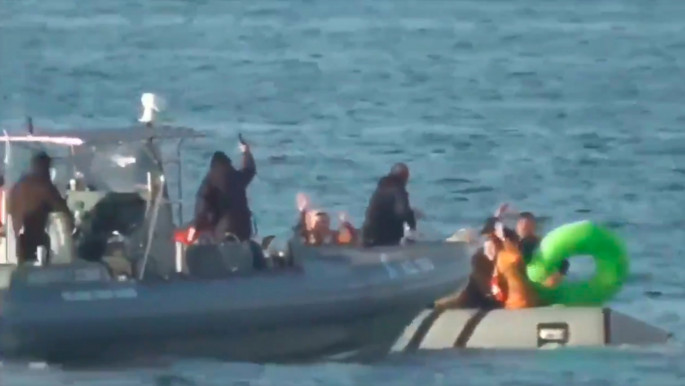Outrage after Greek coastguard filmed 'attacking' refugee boat
Ankara said the dinghy was sailing off the coast of Bodrum, across the relatively narrow stretch of water between the Turkish mainland and Greek islands.
The footage shows a large inflatable motor boat approaching the dinghy while a man hit it with a stick.
Another man on board the inflatable motor boat is seen firing a gun into the water, while a larger Greek coast guard vessel sails nearby.
It is not clear from the footage where the man was shooting but shouts can be heard in the video.
In another portion of the video, a large Greek coast guard vessel appears to head towards the dinghy at speed, narrowly missing the fragile vessel.
The footage has sparked outrage on social media where commentators said the video was evidence of the Greek authorities "pushing back" refugees and migrants.
Both the Greek and Turkish authorities have faced accusations of migrant push-backs - forcing refugees or migrants back over a border they have just crossed without giving them the opportunity to apply for asylum.
The new footage appears to constitute evidence of the practice, which is much harder to come by.
Push-backs are illegal under European Union law.
 |
| Footage shared by the Turkish government shows a man with a gun confronting the refugees' dinghy [Twitter] |
Later on Monday, an NGO that offers support to migrants attempting to cross the Mediterranean said it had received reports of at least six vessels "violently forced back to Turkey" since Sunday.
We have "received distress calls by over 220 people on 6 boats in the Aegean Sea who were violently forced back to Turkey by both Greek and Turkish Coastguards", Alarm Phone said in a tweet.
|
|
Victims reported facing "the removal of engines and fuel, threats by masked men with weapons, shootings at boats, or non-assistance when in distress", the NGO added.
Meanwhile, Greek authorites released a separate video showing a boat heading to the island of Lesbos, accompanied by a Turkish patrol vessel while in Turkish waters.
Athens said 48 migrants were on the dinghy, which it claimed that the Turkish vessel deliberately overturned once in Greek waters, triggering a rescue operation. Such an action would have forced Greek authorities to take the migrants ashore.
Two children were hospitalised after the incident, one of whom died after resuscitation efforts failed, the coastguard said.
A new migrant crisis?
The United Nations refugee agency has called on both nations to "refrain from any measures that might increase the suffering of vulnerable people"."All states have a right to control their borders and manage irregular movements, but at the same time should refrain from the use of excessive or disproportionate force and maintain systems for handling asylum requests in an orderly manner," the UNHCR said in a statement.
In recent days, around 13,000 people have gathered along the Turkish-Greek land border.
Refugees and migrants began to travel to Turkey's northwestern Edirne province with the hopes of crossing into Greece and onwards to western Europe last week, when Turkish President Recep Tayyip Erdogan declared his country's borders with neighbouring Greece and Bulgaria would be opened.
The shock move followed years of threats by Erdogan that he would "open the gates" to Europe and followed the killing of 34 Turkish soldiers in a Syrian regime airstrike.
Analysts say the Turkish president hopes to goad western leaders into providing military and humanitarian support.
Greece responded to the move by blockading its border with Turkey, firing tear gas at the thousands of refugees and migrants waiting in the no-man's land between the two countries.
The Greek border police have also been accused of executing push-backs at other areas of the border, as well as reportedly killing one Syrian refugee on Monday.
Athens also suspended asylum procedures in a bid to prevent migrants from crossing over the border, a move for which the UNHCR said it had no legal justification.
"Neither the 1951 Convention Relating to the Status of Refugees nor EU refugee law provides any legal basis for the suspension of the reception of asylum applications," it said on Monday.
The top three chiefs of the EU's institutions - its executive, parliament and Council - will visit the Greek-Turkish border in support for Athens, European Commission President Ursula von der Leyen said on Monday.
"I acknowledge that Turkey is in a difficult situation in regards to the refugees and migrants, but what we see now cannot be the answer and the solution," von der Leyen said.
"The challenge that Greece is facing right now is a European challenge," she added.
Agencies contributed to this report
Follow us on Facebook, Twitter and Instagram to stay connected

![Palestinians mourned the victims of an Israeli strike on Deir al-Balah [Getty]](/sites/default/files/styles/image_684x385/public/2024-11/GettyImages-2182362043.jpg?h=199d8c1f&itok=xSHZFbmc)


![The law could be enforced against teachers without prior notice [Getty]](/sites/default/files/styles/image_684x385/public/2178740715.jpeg?h=a5f2f23a&itok=hnqrCS4x)
 Follow the Middle East's top stories in English at The New Arab on Google News
Follow the Middle East's top stories in English at The New Arab on Google News

![Palestinian journalists in West Bank [Getty]](/sites/default/files/styles/image_330x185/public/2167088057.jpeg?h=a5f2f23a&itok=smdkN-46)
